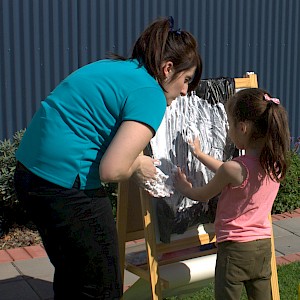Today is World Teachers Day and it is a great time to think about how therapists and teachers can work together to best support children with additional needs.
Teachers see children every day and so have an extensive knowledge of how children perform in different learning tasks as well as how they manage working independently and in groups. As well as knowing about children’s learning they also know about children’s social and communication skills, their ability to attend to tasks and concentrate, their ability to manage their emotions and control their behaviour in various real-life situations. They know how children relate to their peers both in the classroom and in the playground. They see children use a range of skills everyday including: fine and gross motor skills, speech and language skills, eye hand coordination, cognitive skills, planning, negotiating and problem solving, and know how children compare to their peers in these areas.
At Talking Matters, we value teacher’s knowledge and commitment to the child whose support we share. We also know that teachers are very busy and do not always have time to chat about child’s therapy or progress even though they care about this. We provide written feedback by email to teachers about the children we work with in schools and are available to discuss children further by phone, email or a face to face meeting at a time that works best for everyone.
Parents and therapists also have knowledge of children’s skills and performance in different areas and when these all work together children make the best progress. Parents can often be the link between the others, sharing information about progress, achievements and concerns which can facilitate communication and cooperation.

Parents can support teachers and therapists by:
- Providing consistency by following up with task practice and strategies at home
- Promoting communication and team work by sharing progress and concerns
- Supporting cooperation by speaking positively with your child about your child’s support people
- Alerting others to any important changes in your child or their life
Speech pathologists can support teachers by:
- Sharing specific information about your child’s communication skills
- Providing strategies to support your child’s ability to listen, comprehend, follow instructions and retain information
- Providing strategies to support your child’s ability to express themselves verbally and in writing
- Providing strategies to support the skills that underlie literacy development such as language and phonological awareness skills
- Providing strategies to support social communication skills such as conversation, turn taking, negotiating and discussing
- Providing strategies to support your child’s ability to produce oral and written texts such as recounts, procedures and stories
Occupational therapists can support teachers by:
- Providing information about your child’s fine and gross motor abilities and how to support these needs
- Providing information about your child’s sensory sensitivities and needs and how to support these
- Providing strategies to help your child to remain calm, focused and on task
- Providing strategies for modifying the classroom to maximise focus and attention
- Providing support about the best seating and classroom tools to suit your child
- Providing strategies to modify tasks to accommodate a child’s motor or sensory challenges
Psychologists can support teachers by:
- Providing strategies to manage your child’s behaviour and emotional needs
- Providing information about your child’s learning strengths and weaknesses
- Providing information about how your child learns best
Teachers can support therapists by:
- Providing information on a child’s skills and performance on tasks in school settings
- Sharing information about how they would best like to communicate with therapists
- Sharing their goals and priorities for the child in the school setting
- Sharing what level of support they would prefer from the therapist
- Providing feedback on a child’s progress
- Alerting therapists to any changes to a child’s skills or behaviours
- Trialling strategies and providing feedback
- Sharing any information about a child’s skills, preferences and interests that may be useful
Are you concerned about your child's progress at school? Talking Matters provides speech therapy and occupational therapy for children in our clinic in Elizabeth Downs as well as a number of schools in the northern areas of Adelaide, South Australia. We offer a range of group programs in school holidays. Browse our website to find out more, or contact our staff for further information.
More information about speech, language, motor skills and sensory skills is available from the download section of our website. Check our Pinterest page for activities, information and ideas. Check the Talking Matters website for other useful resources. Like us on Facebook and follow us on Twitter so you don't miss out on what's happening.
Related Blog Posts
If you liked this post you may also like:
Use visuals 10 ways!
Why 20% of kids struggle!
Emergent literacy
10 school ready tips



